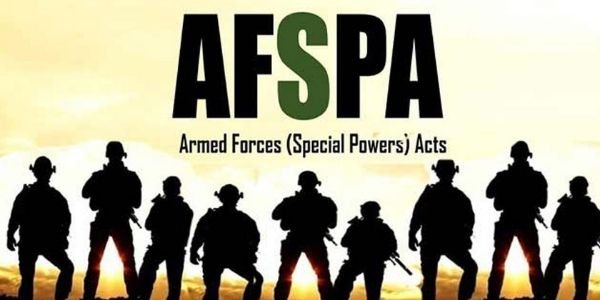Why in news ?
- After the recent killings of 14 civilians in Mon district of Nagaland, the state government has demanded the repeal of the Armed Forces (Special Powers) Act 1958.
- A group of daily wage workers who were returning to their village were killed by security forces, reportedly after information that some NSCN(K) terrorists were travelling in the area.
- The Mon district is dominated by the Konyak Hoho tribes and the villagers killed in the incident belonged to the community.
What is it?
- Armed Forces (Special powers) Act (AFSPA), 1958 is an Act of the Indian Parliament which empowers the nation’s Army to conduct search, arrest or shoot to kill people without warrant.
- AFSPA can be implement in areas which the government identifies as ‘disturbed’, under the Disturbed Areas (Special Courts) Act 1976.
- Disturbed Areas: Disturbed area means an area which is for the time being declared by notification under section 3 of the AFSPA to be a disturbed area due to violence between different religions , caste, communities or regions.
- Powers to declare areas to be disturbed areas are with the Governor of the State ,or Administrator of the Union Territory , or the Central Government.
AFSPA in Nagaland :
- India inherited AFSPA from the colonial British Ordinance 1942.
- The British annexed Assam in 1826, and in 1881, the Naga Hills too became part of British India.
- The Armed Forces (Special Powers) Act 1958 was implemented in Nagaland on 11th September,1958.
- Initially the Act was passed by Independent India to suppress the rebellion movement of the Naga people.
- The Naga National Council (NNC), in 1951, had conducted a plebiscite in which 99 percent of the Naga people voted for a “Free Sovereign Naga Nation.”
- The Naga Hills, a district of Assam, was made Nagaland state in 1963.
- On November 11, 1975, the government got a section of NNC leaders to sign the Shillong Accord, under which this section of NNC agreed to give up arms.
Has there been any review of the Act?
- On November 19, 2004, the Central government appointed a five-member committee headed by Justice B P Jeevan Reddy to review the provisions of the act in the north eastern states.
- The committee submitted its report in 2005, which included the following recommendations:
1. AFSPA should be repealed and appropriate provisions should be made in the Unlawful Activities (Prevention) Act,1967 .
2. The Unlawful Activities Act should be modified to clearly specify the powers of the armed forces and paramilitary forces .
3. Grievance cells should be set up in each district where the armed forces are deployed. - The 5th report of the Second Administrative Reforms Commission has also recommended the repeal of the AFSPA.
Criticisms of AFSPA-
- Civilians’ killings: scores of civilians’ killings in the region over the last several decades since the AFSPA came into force.
1. In 1995, nine innocent civilians were killed by CRPF in front of RIMS hospital, Imphal.
2. In 2000, ten civilians were killed by the Assam Rifles at Malom leikai following a blast at Imphal‘s Tulihal Airport. - Rising militancy: Critics said that this undemocratic act has failed to contain terrorism and restore normalcy in disturbed areas as the number of armed groups has gone up after the act was established. Many even hold it responsible for the spiralling violence in areas it is in force.
- No immunity: In 2016, the Supreme Court has said that the Army is not immune to any prosecution by criminal court if found committing any offence.
- Human rights violation: Act provides the security personnel with absolute powers without being accounted for. This leads to various atrocities and human rights violation by the security agencies.
- Disregard to ARC recommendations: In 2007, the fifth report on public order of the Second Administrative Reforms Commission (ARC) recommended that AFPSA be repealed and quoted “Repeal of AFPSA would remove the feeling of discrimination and alienation among the people of the North-Eastern States”.
Arguments in favour of AFSPA-
- Protect borders: With the powers given by AFSPA, the armed forces have been able to protect the borders of the country for decades.
- Army’s stand: The army is opposed to the withdrawal of Afspa. Many argue that removal of the act will lead to demoralising the armed forces and see militants motivating locals to file lawsuits against the army.
- Effective Counter-insurgency: A strict law is needed to tackle the insurgent elements inside the country particularly in the Kashmir and northeastern region.
Way forward-
AFSPA could not achieve its desired objectives even after 60 years of its enforcement. One can never tolerate human rights violation committed in the name of AFSPA, so the government should bring a scientific and humanitarian approach towards solving the socio-economic problems of the disturbed areas rather than implementing a law that violates people’s right to life and dignity with impunity.
Konyak Hoho tribe-
- The Konyaks are the largest of the Naga tribes.
- They are found in Tirap, Longding, and Changlang districts of Arunachal Pradesh; Sibsagar District of Assam; and also in Myanmar. They are known in Arunachal Pradesh as the Wanchos (‘Wancho’ is a synonymous term for ‘Konyak’).
Shillong Accord-
The Shillong Accord of 1975 was an agreement,which was signed between the Government of India and Nagaland’s underground government, also known as the Naga Federal government:
- To accept the supremacy of Constitution of India without condition.
- Surrender their arms.
- Renounce their demand for the secession of Nagaland from India.
